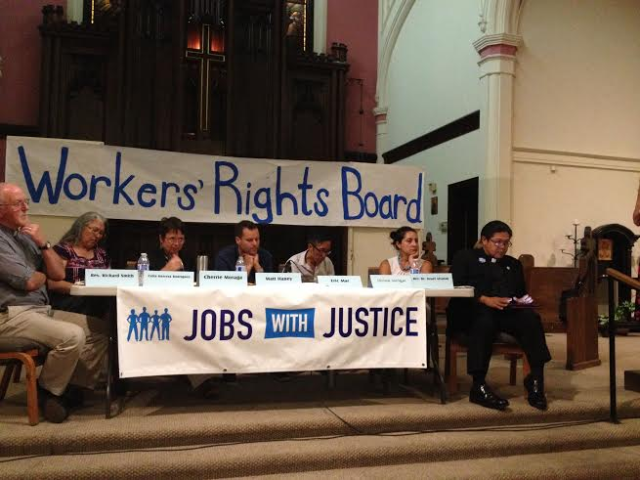Teachers, students from SF State, City College and SF Art Institute decry salary cuts, job insecurity — and the impact of education

By Marco Gonzales
SEPTEMBER 10, 2015 — Higher public education in the Bay Area just isn’t what it used to be. From exponential tuition hikes to the ever-dwindling job security teachers continue to face, the burden of payment and inequity ultimately falls onto the students.
Faculty and student representatives from American Federation of Teachers local 2121 (AFT 2121), the California Faculty Association (CFA), San Francisco State, and the San Francisco Art Institute gathered Wednesday at St John’s Evangeline Episcopal church for a Workers Rights Board hearing to address the growing pay disparity for teachers in the California state system.
A panel of members from the nonprofit advocacy group Jobs with Justice sat at the front of the room, listening to testimonials by faculty and students.
“During the last decade, the numbers of CSU faculty hired on a part time, low wage, temporary basis has exploded, increasing at a jaw dropping 46 percent,” Sheila Tully, president of the California Faculty Association at San Francisco State, said.
Contracted by the semester or quarter, these part-time teachers face constant uncertainty over future job security, often racing back and forth to teach at multiple campuses across the Bay Area (leading to the name “freeway fliers.”)
This unstable working climate for teachers has a direct impact on student learning outcomes, Tully said. “Study after study links student success with strong mentoring by faculty. It’s clear for the CSU management that faculty and students are not priorities.”
CFA reported that the average faculty salary at San Francisco state from 2004-2013 dropped $9,748, while the average faculty salary at UCSF rose by $16,138 in the same period.
Phil Klasky, an ethnic studies teacher and CFA member at SF State, said the continued disinvestment at the state and federal level have left faculty salaries stagnant, unable to keep up with the cost of living in the Bay Area. Ultimately, many prospective or current teachers are deciding to move to jobs in the private sector.
Many who testified at the hearing spoke of the trend of rising administrative pay, and the declining faculty job security and salaries, as a disservice to the students and public education.
“It’s important for us to have a response that has language that can address the real issues” Celia Rodriguez said, an ethnic studies teacher at Cal Berkeley, “Without a political analysis or clear understanding of what’s going on, I don’t exactly know how we’re going to organize a response, other than an emotional one.”
Amid gridlocked contract negotiations for City College faculty, AFT 2121 has organized a clear response to the administrations proposed 15 percent reduction of class offerings over the next three semesters due to low enrollment.
More than 90 percent of AFT 2121 members voted to raise their annual dues to create a strike hardship fund, which would aid the most financially vulnerable faculty if the union decides to go on strike.
“The administration’s proposal to cut classes will hurt students and faculty,” AFT 2121 president Tim Killikelly said in a press release on Tuesday. “Their wage proposal is just not competitive or realistic. How can faculty be expected to live in the Bay Area on what we are being offered?”
The City College faculty has never gone on strike. The fact that the possibility is this close is a sign that the negotiations are at the boiling point.



